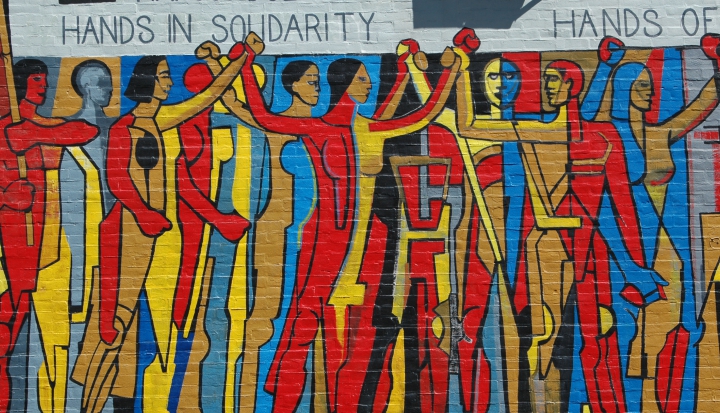When the union’s inspiration through the workers’ blood shall run
There can be no power greater anywhere beneath the sun
Yet what force on earth is weaker than the feeble strength of one
For the Union makes us strong –Solidarity Forever
Thus begins the age-old ballad of America’s labor movement, with subsequent verses describing solidarity as a power greater than gold, greater than the might of armies.
Today, Monday, June 15, at small conference at the national headquarters of the AFL-CIO, I have the privilege of making a few remarks about the Catholic ideal of solidarity. The keynote speaker for the event is the erudite Cardinal Donald Wuerl, Archbishop of Washington. His Eminence will be introduced by AFL-CIO President Richard Trumka. My friend, and America’s foremost labor priest, Father Clete Kiley of the Archdiocese of Chicago, will offer a reflection on Cardinal Wuerl’s talk. The room will be filled with union presidents, Catholic bishops and priests, union organizers, and Catholic social justice leaders. There will be theologians speaking about solidarity from the perspective of different faith traditions, as well as labor and Catholic leaders discussing solidarity in the Latino experience. How poignant it is to see a rekindling of friendship between America’s labor unions and the church ahead of the Pope Francis’ historic visit to the United States in September!
Solidarity is indeed greater than gold, greater than the mere might of armies. It is also a virtue that’s been spiraling down in long retreat. Neighborhoods, families, and all the little communities of our daily lives have faded in an era that valorizes the self and makes individual choice absolute. Labor unions and the Catholic Church have been similarly impacted. The logic of our age seems to work against solidarity. Some argue that union and parish halls have become quiet, gray-haired places. But something’s afoot and things are changing.
I’ve always been intrigued by the many theories and groups that actually rejoice in the decline of solidarity—libertarians, devotees of Austrian economics’ methodological individualism, Ayn Rand’s objectivists, and varieties of anarchists. For many Americans, too, there’s something naively romantic about the storybook character of the rugged individual who subsists without for others. In all of these worldviews, solidarity is viewed with suspicion—a sort of weakness at best or (nodding to Hayek) serfdom at worst. But, in fact, it’s the individual who is at risk, not the community. The isolated individual struggles to stand with authenticity vis-à-vis the macro forces of global economics, mass society, and the modern state.
Richard Trumka, introducing Cardinal Óscar Rodríguez at an Institute for Policy Research & Catholic Studies event last year, shared an emotional family story that conveys the importance of solidarity for empowerment. I hope that he doesn’t mind me retelling it here.
Trumka grew up in Nemacolin, Pennsylvania, a coal mining town that was owned lock, stock, and barrel by mining interests. Like that line from the old country song, the only store was the company store. His father and grandfather were among the workers trying to unionize—trying to come together to shelter otherwise individual workers from the powers arrayed against them. Gathered in the woods for a union meeting, they were rousted by company “police” charging them on horseback. Running for safety they headed to the one building in town not owned by the company—Our Lady of Consolation Catholic Church, where the pastor, Father Simko, leapt between the workers and the company police on the steps of the church, cross held high. Here’s a link to Trumka’s own telling of his family history.
Trumka’s story holds out an example of solidarity, both metaphorically and actually. Innumerable forces are arrayed against all of us in the contemporary world—many of them faceless dynamics of society and economics—against which the individual has little resistance, no matter how rugged she may be. In the words of the old union ballad, “What force on earth is weaker than the feeble strength of one?”
A revitalization of solidarity amidst these challenges is desperately needed. It’s so promising, then, to see unions and the church getting reacquainted. Workers and bishops, shop stewards and theologians. I’m honored to play some small part in this historic gathering. Solidarity forever.
Stephen Schneck’s blog, Church and state, will update every Monday. Follow him on Twitter @StephenSchneck.
Image: Flickr cc via Terence Faircloth















